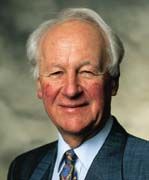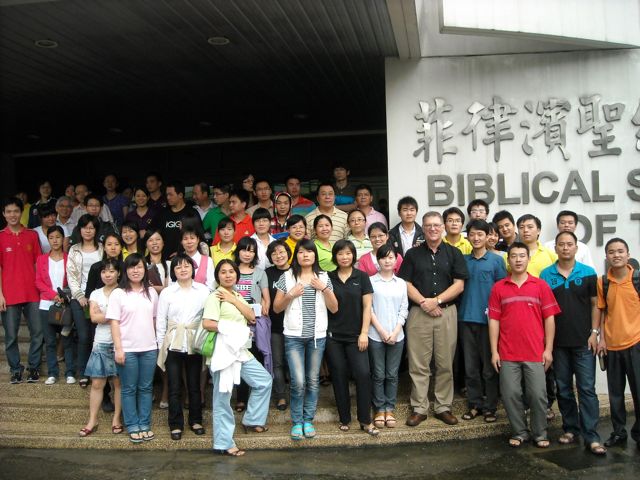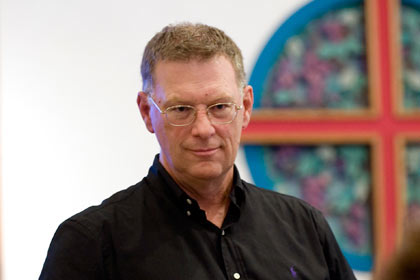 John Stott (1921-2011) has died. Like countless other Christians I mourn his passing. An internationally-respected British Anglican, he was a gifted Christian statesman, and a man of humble integrity, warm grace and prodigious gifts. Perhaps best of all, he finished well. We will miss him, and pray that others of comparable (or at least approximate) quality will emerge to take his place. One cause of the disillusionment of our times is the declining number of people who truly deserve respect. We are becoming, in the words of a twentieth-century history of Scotland, a society with No Gods and Precious Few Heroes. But John Stott has been a happy exception.
John Stott (1921-2011) has died. Like countless other Christians I mourn his passing. An internationally-respected British Anglican, he was a gifted Christian statesman, and a man of humble integrity, warm grace and prodigious gifts. Perhaps best of all, he finished well. We will miss him, and pray that others of comparable (or at least approximate) quality will emerge to take his place. One cause of the disillusionment of our times is the declining number of people who truly deserve respect. We are becoming, in the words of a twentieth-century history of Scotland, a society with No Gods and Precious Few Heroes. But John Stott has been a happy exception.
Continue Reading →
Archive | current events RSS feed for this section
John Stott Is Dead but Not Forgotten
Does Christianity Grow or Just Move On?

I have just returned from Manila this week, where I had the privilege of teaching on Christian spirituality to a wonderful cohort of eager Filipino-Chinese and Mainland Chinese students. The latter are the “tip of the iceberg” of a remarkable, grass-roots movement of vibrant Christianity emerging out of a country that has been officially (and sometimes repressively) atheistic and Communist since 1949. Most of these bright, passionate young adults are university-trained students, and many of them possess Mac computers and international cell phones. Yet they have come to accept the prospect of suffering, and have embraced radical consecration, to a degree only sometimes seen nowadays among their North American Christian counterparts. What’s going on? Is Christianity really dying out in the West while growing up in Asia and Africa? If so, it raises another, somewhat troubling question: Does the Christian faith actually expand, or does it just migrate elsewhere?
Judgment Day May 21?

I was down at San Diego’s Earth Day a few weeks ago, helping to staff a booth run by Christians for Earth Care, and took a break to browse the area. The atheists were there in full force, exposing what they believe to be the idiocy of religion and people of faith. I stopped to chat with them for a bit; it became immediately apparent that they weren’t the brightest bulbs in the chandelier, but on some points they were relatively coherent . . . and they were enjoying lots of traffic.Then I spied the Day of Judgment guy.
Financial Debt and Religious Freedom

A profound social transformation has been taking place right in front of us, and we have barely noticed. Very quietly a revolution in attitude has occurred. It is simply this: debt has been normalized. As a professor I see it every day where students preparing for the (generally underpaid) Christian ministry blithely assume enormous debt to finance their seminary education. They are in effect committing themselves to long-term financial hardship. In some cases their only hope will be to declare chapter 7 bankruptcies. But this is simply a reflection at the personal level of a much larger national disposition. America is staggering toward its own bankruptcy, and we cannot seem to get a handle on the problem. This week I discovered another reasons why our growing debt should be a particular concern for Christians. It came out of a news report from China.
Pipe Bombs and Confessionals
San Diegans have become callous to the daily reports of crimes in “America’s finest city.” Nevertheless some stories stand out because of their particularly disturbing or shocking nature. The story this past week of a middle-aged man suspected of planting a pipe bomb underneath his wife’s vehicle fits this category. His homemade bomb exploded as he planned when she started for home after a day’s work at a daycare. Though the bomb did not kill her, it destroyed her car and left her in critical condition. The 52-year old wife, by all accounts, is a lovely and gracious woman. The husband is being held without bail on suspicion of attempted murder. It turns out he is an evangelical Christian. Ouch.
The Future of Smoke Stacks

Beijing is a polluted city. Not even the spin-doctors deny that the air here is bad. On a windy day you can taste it. But upon my arrival it still came as a surprise to see a huge ten-storey industrial smoke stack right across the street from my apartment on the campus of Renmin (the People’s) University. Encased in scaffolding, workers have been banging and jack hammering on it every day. The project’s location struck me as particularly offensive—way too close to this residential university, an inappropriate site in an already-dense urban environment. And then eight weeks on I made a surprising discovery. The smoke stack is not going up; it’s actually coming down! It’s another sign that China is making a serious effort to go “green.”
The Canary in the Gulf of Mexico

At the moment the world is fixated on the video-cam of oil spewing up out of the earth to defile the Gulf of Mexico. Everyone is hoping and praying that a technical solution will be found to stabilize this environmental holocaust. Should this occur in the near future, we will breathe a collective sigh of relief. Inevitably there will be resolutions to tighten up oil drilling safety standards and improve emergency response strategies, but perhaps the greater tragedy will be if in a few weeks or months we resume our same dangerous and unsustainable way of life. If this disaster proves to be of sufficient magnitude that it will not be possible thereafter to revert to business as usual, the tragedy itself may end up a “severe mercy.” We may look back on it as the moment when “the canary died in the coal mine.” It may be our chance to break out of something that is otherwise going to kill us all.
Religion as Therapy in China

I have been in Beijing, China for about three weeks now as a visiting scholar at Renmin (the People’s) University, founded by Chairman Mao, and at the Chinese Academy of Social Sciences. I am comfortably housed in the Foreign Expert Building on the University campus, and get to bike around the leafy campus alongside many of future leaders of the Communist Party and of China itself. Without denying the real differences between West and East, it’s surprising how much is the same, even in the sphere of religion.
The Rest of the Story
This past week the Los Angeles Times ran a brief obituary of the distinguished English scholar Antony Flew (1923-2010). Flew was a high-profile academic philosopher noted, even among impressive peers, as an exceptional intellect. After service in the Royal Air Force during World War II, he studied at Oxford and there participated in weekly meetings originally organized by C. S. Lewis. The author or co-author of more than thirty books, he is best known for his rigorously logical arguments against the existence of God.
However, this champion of atheism began to waver in his convictions later in life. The possibility that the planet’s delicate ecosystem might be the product of mere chance seemed increasingly improbable to him, and in the end, and without any intellectual slippage, he had crossed over to the other side of the divide over God.
His brief obituary also mentioned that he was the son of a Methodist minister, and as a teenager had abandoned belief in God after wrestling with the problem of evil. Flew’s father died years before his son saw the light, and never lived to see the unlikely turnaround in his brilliant sons’ heart and mind. It’s a reminder that everyone is on a lifelong journey, and it’s never over ’til it’s over. Sometimes waiting fathers and mothers, and other loved ones, may even dare, like Abraham and Moses and a host of other saints, to die in hope. We may not always get to see the rest of the story.
“Big Mac” and Compunction
In a televised interview this past week Mark McGuire (Big Mac), one of major league baseball’s greatest home run hitters ever, admitted something he’s never been willing to admit before, even during a United States congressional hearing. He finally conceded that during the time he was setting all his hitting records as a St. Louis Cardinals he was also using steroids—a substance banned by the league and dangerous to any user’s long-term health. Yet his “confession” felt deeply unsatisfying to most people who watched it; the missing ingredient was compunction.
Glen G. Scorgie, PhD
Scorgie is professor emeritus of theology at Bethel Seminary of Bethel University. He taught at Bethel Seminary San Diego from 1996-2022. He is involved in the Chinese Bible Church of San Diego and teaches at Pacific Theological Seminary. He has frequently lectured in Asia.
Recent Posts
Categories
- apologetics (6)
- Canada (1)
- China (10)
- church (19)
- current events (30)
- disability (1)
- ecology (12)
- education (1)
- ethics (30)
- excellence (5)
- gender (5)
- history (9)
- missions (9)
- mothers (3)
- movies (4)
- Politics (2)
- psychology (3)
- repentance (4)
- spirituality (14)
- theology (12)
- Uncategorized (3)
- virtue (12)
- war (3)
- worship (5)
